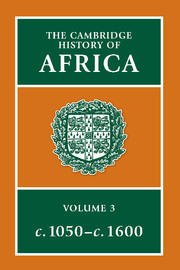Book contents
- Frontmatter
- Introduction: some interregional themes
- 1 Egypt, Nubia and the Eastern Deserts
- 2 Ethiopia, the Red Sea and the Horn
- 3 The East Coast, Madagascar and the Indian Ocean
- 4 The eastern Maghrib and the central Sudan
- 5 The western Maghrib and Sudan
- 6 Upper and Lower Guinea
- 7 Central Africa from Cameroun to the Zambezi
- 8 Southern Africa
- 9 The East African interior
- Bibliographical Essays
- Bibliography
- Index
- References
6 - Upper and Lower Guinea
Published online by Cambridge University Press: 28 March 2008
- Frontmatter
- Introduction: some interregional themes
- 1 Egypt, Nubia and the Eastern Deserts
- 2 Ethiopia, the Red Sea and the Horn
- 3 The East Coast, Madagascar and the Indian Ocean
- 4 The eastern Maghrib and the central Sudan
- 5 The western Maghrib and Sudan
- 6 Upper and Lower Guinea
- 7 Central Africa from Cameroun to the Zambezi
- 8 Southern Africa
- 9 The East African interior
- Bibliographical Essays
- Bibliography
- Index
- References
Summary
PROLEGOMENA AND ORIENTATIONS
The sources available for the history of Guinea before the seventeenth century are not good. The Arabic writers whose works enable historians with some confidence to reconstruct the main political outlines of the West African Sudan from about the eleventh century onwards, and even to gain some insight into aspects of its economic and social history, were in general uninformed about developments further south. Literacy in Arabic did spread to some of the peoples of Guinea, but it did not do so significantly before about the seventeenth century, and there are few if any surviving documents of historical value whose origins relate to earlier than the eighteenth century. With the advent of European traders to the Guinea coasts in the fifteenth century, a considerable corpus of documentation in European languages did begin to build up. But centuries were to pass before Europeans began to penetrate significantly into the interior. Their direct knowledge, and that of the Africans who acquired literary skills from them, was therefore confined to the coastlands. Even here there must have been much which escaped their notice, and even more that was at best imperfectly understood, while what they had to say about what was going on further than a few miles from the coast was essentially hearsay.
Some of the historical traditions maintained orally by the peoples of Guinea themselves certainly relate to times before 1600. In lower Guinea, for example, there are some traditions, such as those of the Yoruba, the Edo of Benin, and the Akan, which have something to say about events which may have occurred as far back as the thirteenth century – in extreme cases, perhaps even to as far as about the eleventh century.
- Type
- Chapter
- Information
- The Cambridge History of Africa , pp. 463 - 518Publisher: Cambridge University PressPrint publication year: 1977
References
- 2
- Cited by

